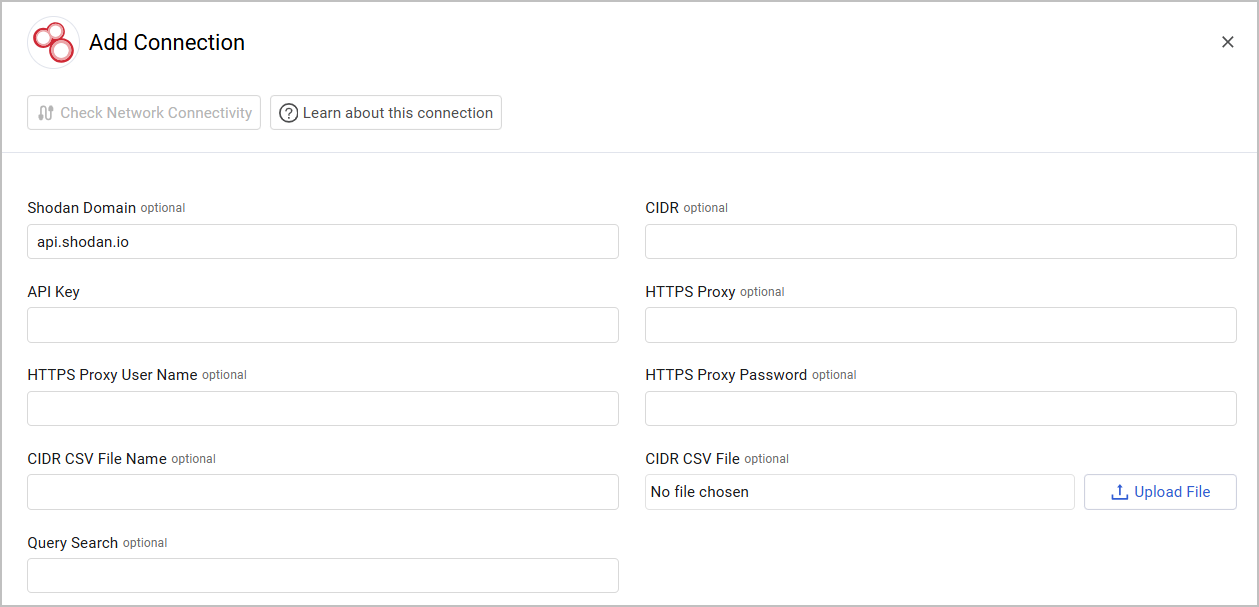Shodan
Shodan is a search engine for Internet-connected devices.
Based on specified subnet or list of subnets, data fetched from Shodan include: hostname, ports open to the world, vulnerabilities, address information (country, region, city), ISP and more.
Asset Types Fetched
- Devices
- Aggregated Security Findings
- SaaS Applications
- Domains & URLs
Before You Begin
Authentication Methods
- API Key
Required Permissions
The adapter connection requires an API Key associated with a Shodan account that has the necessary permissions to fetch assets.
Generating the Shodan API Key
- Register an account in Shodan.
- Visit your registered email id and activate the account.
- Login to your account and you will find the API keys under profile overview tab.
- Copy the API key and specify it in the API Key field.
Connection Parameters
To connect the adapter in Axonius, provide the following parameters.
Required Parameters
- Shodan Domain (default: api.shodan.io) - Should be kept as
api.shodan.io. - API Key - Enter the API key you have defined (see Generating the Shodan API Key).

Optional Parameters
Note
You have to either enter a CIDR CSV File, a CIDR subnet list, or a Query Search in order to configure this adapter.
- CIDR (default: empty) - Specify a subnet to be used for fetching data from Shodan. If you want Shodan to scan multiple subnets, use the CIDR CSV File option to upload a CSV file with a list of subnets.
- CIDR CSV File Name - This field is mandatory if a CSV File is being uploaded. If you upload several CIDR CSV files (in different Shodan adapter servers), you can specify a logical name for that file. The entered file name will be displayed in the Shodan adapter server list, enabling you to easily distinguish between different Shodan adapter servers.
- CIDR CSV File - Upload a CSV file with a list of subnets to be used for fetching data from Shodan. Click Upload File to upload the file. The structure of the CSV file should be as follows:
-
"CIDR" column (required) - Each row in the CSV should be populated with its subnet in the
X.Y.Z.N/Pformat. -
DNSNAME column (optional) - Each row in the CSV should be populated with the server name, if known.
Note
While the
DNSNAMEcolumn is optional, the CSV file must contain at least two columns (CIDR and one other).
-
- Query Search - Specify a search query using Shodan's search query syntax. This field will tell the adapter to execute the query you have specified to find devices information.
- HTTPS Proxy - Enter an HTTPS proxy address to connect the adapter to a proxy instead of directly connecting it to the domain.
- HTTPS Proxy User Name - Enter the user name to use when connecting to the value supplied in Host Name or IP Address via the value supplied in HTTPS Proxy.
- HTTPS Proxy Password - Enter the password to use when connecting to the server using the HTTPS Proxy.
To learn about additional optional/common adapter connection parameters, see Adding a New Adapter Connection.
Advanced Settings
Note
- Advanced settings can apply to either all connections of this adapter, or to a specific connection. For more detailed information, see Advanced Configuration for Adapters.
- For more general information about advanced settings, see Adapter Advanced Settings.
- Ignore "www" in hostname before shorting (default: false) - Enable this option to remove the
wwwfrom the device hostname. This way, the "short hostname" configuration will affect the domain and not thewwwpart. - Fetch Vulnerabilities (default: true) - Select whether to fetch vulnerabilities (parsed as Aggregated Security Findings).
- Parse devices as Domain & URLs (default: false) - Enable this option to duplicate device data fetched from Shodan and display it within the URL & Domains asset type as well as the Devices asset type.
Updated 3 days ago
